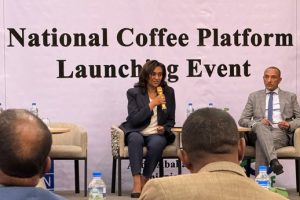
• Go Ethiopia Global Linen Textile Forum launches
ADDIS ABABA-Ethiopia is poised to exceed one billion USD in export earnings from its textile and apparel sector by 2030, according to the Ethiopian Investment Commission (EIC).
The ambitious projection was shared during the “Go Ethiopia Global Linen Textile Forum,” organized yesterday by the China-based Kingdom Group in collaboration with the EIC.
In his keynote address, EIC Commissioner Zeleke Mengistu (PhD) highlighted the sector’s significant progress. Textile and apparel exports have grown from 60 million USD in 2015 to over 500 million USD in recent years, despite global economic challenges. He noted that with sustained investments, the sector is on track to surpass one billion USD in export earnings by the end of the decade.
With a population exceeding 120 million-more than 70% under the age of 30-Ethiopia boasts a young, vibrant, and trainable workforce.Zeleke pointed out the country’s abundant natural resources, including over five million hectares of arable land suitable for cultivating textile inputs, only 30% of which is currently utilized. This positions Ethiopia as a global leader in textile production.
Ethiopia’s strategic location offers exceptional access to international markets. Investments in infrastructure, such as the Addis Ababa-Djibouti railway for efficient port access and Bole International Airport, one of Africa’s busiest air cargo hubs, ensure seamless trade connectivity. Investors also benefit from extensive incentives, including corporate income tax holidays of up to 10 years, duty-free importation of machinery and raw materials, and streamlined customs procedures, the commissioner elaborated.
Since 2018, Ethiopia has implemented several economic and legal reforms to create a business-friendly environment. These include opening previously restricted sectors to investment, introducing the Special Economic Zones proclamation, and facilitating opportunities in logistics, manufacturing, services, and free trade. Ethiopia’s engagement with the African Continental Free Trade Area (AfCFTA) and its ongoing accession to the WTO further enhance its trade and investment prospects.
“Ethiopia’s reforms aim to broaden the private sector’s role and improve the business climate,” Zeleke emphasized. He invited stakeholders to capitalize on Ethiopia’s competitive advantages, such as affordable energy, skilled labor, and strategic access to key markets.
Kingdom Group Chairperson RenWeiming echoed these sentiments, highlighting Ethiopia’s energetic and young labor force as a major advantage over other countries. “We hope Ethiopia will continue to open its investment market as it implements macroeconomic reforms,” he said.
The forum underscored Ethiopia’s potential as a hub for textile investment, with its combination of natural resources, workforce, strategic location, and supportive policies offering unparalleled opportunities for growth in the global textile industry.
BY TSEGAYE TILAHUN
THE ETHIOPIAN HERALD FRIDAY 22 NOVEMBER 2024





